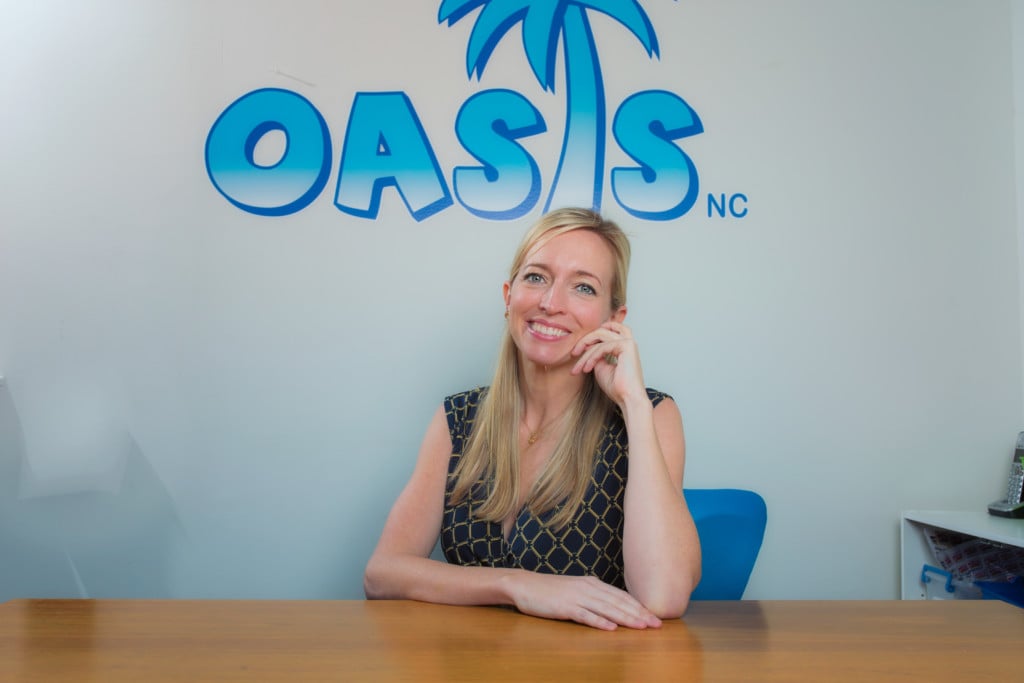Providing an Oasis
Erika Merriman co-founded a school dedicated to students with autism

ERIKA MERRIMAN loved being a special education teacher, but she knew her students with autism needed more. If they were to be successful in life and on the job, they needed social skills. That need propelled Merriman and her fellow educator, Kim Reinhardt, to found Oasis, a school dedicated to students with autism.
Merriman, who became Oasis’s executive director, has an extensive background in education. She earned her bachelor’s degrees in special education and psychology from the University of Miami and her master’s degree in early childhood education from the University of Texas. She taught special education in Texas for two-and-a-half years and in New Hanover County for three years. Then, in 2011, at the urging of her students’ parents, created Oasis.
Merriman’s school is truly an oasis for students with autism. It’s a place where they feel they belong, where they are accepted, and where they make substantive progress toward academic and social goals.
“We really love our students and see a lot of potential in all of them,” Merriman says.
Under her leadership, Oasis, which serves students in grades K-8, is uniquely structured to help students with autism succeed. First, is the student-teacher ratio: two to four students per teacher or teacher’s aide. Next, the school’s students, who range from those who are non-verbal to those who are working above grade level, are divided into four classes. While age is a factor, the classes are primarily based on the students’ abilities and needs.
For example, students who are highly verbal and high energy are placed in a class, while those who are struggling to communicate are in another class. Or, students who are working to master a specific skill such as reading make up a class.
The teachers are certified in special or general education. This ensures advanced students receive grade-level curriculum and that modifications are made for students who need them. The teachers employ a variety of evidence-based teaching strategies. And, the Oasis staff uses their students’ interests as a basis for instruction.
Oasis also provides regular student evaluations: an individualized plan for each student, progress reports every nine weeks, and parent conferences two or three times a year. In addition, the teachers and parents have multiple mini-conferences, and teachers often contact with parents via phone and email, Merriman says.
But what makes Oasis truly special for students with autism is Merriman’s emphasis on social skills. In addition to the teachers’ work on these vital skills throughout the day, Oasis offers after-school and summer programs that also help students communicate effectively. Not only do the students learn how to interact with others appropriately, they practice their skills in the community.
“Students with autism can catch up academically,” Merriman says. “It’s the social skills that are the challenge. They need social skills for employment, to make friends, to be invited to birthday parties.”
Carol Chatfield, whose eleven-year-old son Grant, attends Oasis, has seen the change the school can make in a child. Through Oasis, Grant has become more verbal, using complete sentences without prompting rather than functional language. Recently, he calmly asked his sister to “please stop” rather than yelling or hitting her when she insisted on pestering him – a win the entire family celebrated.
Merriman also instituted another compelling Oasis program: a support group for siblings of students with autism. There, the children learn how to better relate to their sibling with autism as well as share their frustrations and common experiences. But, perhaps the most important aspect of the group is that it is about and for them, Merriman says.
She says she does everything possible to make Oasis’s $18,000 annual tuition affordable. She ensures parents know about the $8,000-$12,000 state grants available for tuition, and the school provides scholarships. In addition, the school holds fundraisers to raise money that either goes to the scholarships or directly to the school.
Merriman says she is determined that all of the school’s students will succeed there and into adulthood.
“Autism is a life-long disability,” she says. “These students need skills they will use throughout their life.”
For more about Merriman’s work, check out the Take 5 feature in the March issue of WILMA.